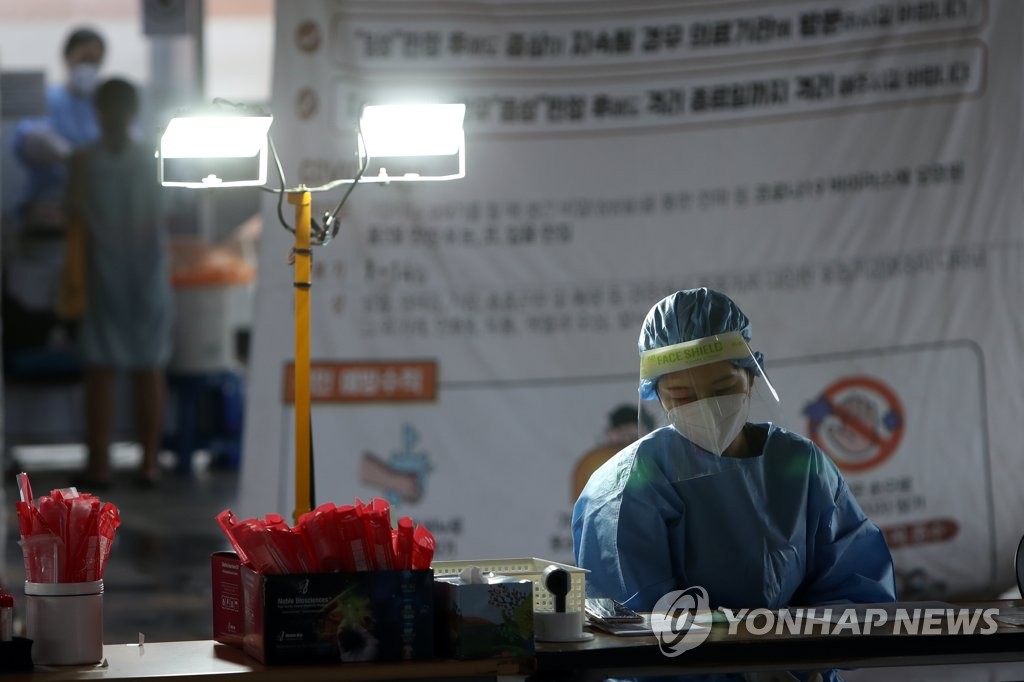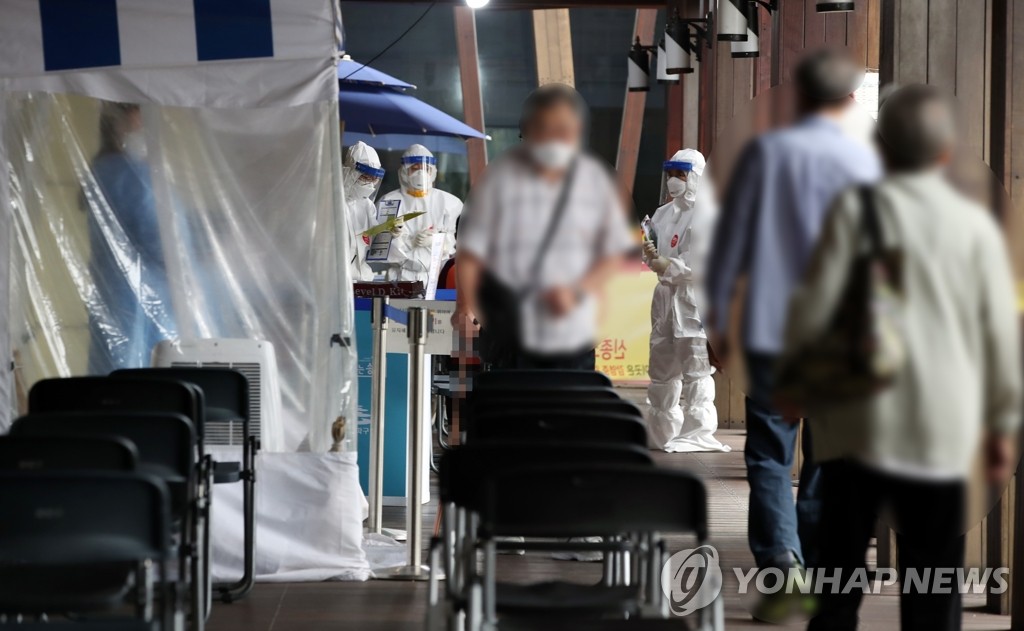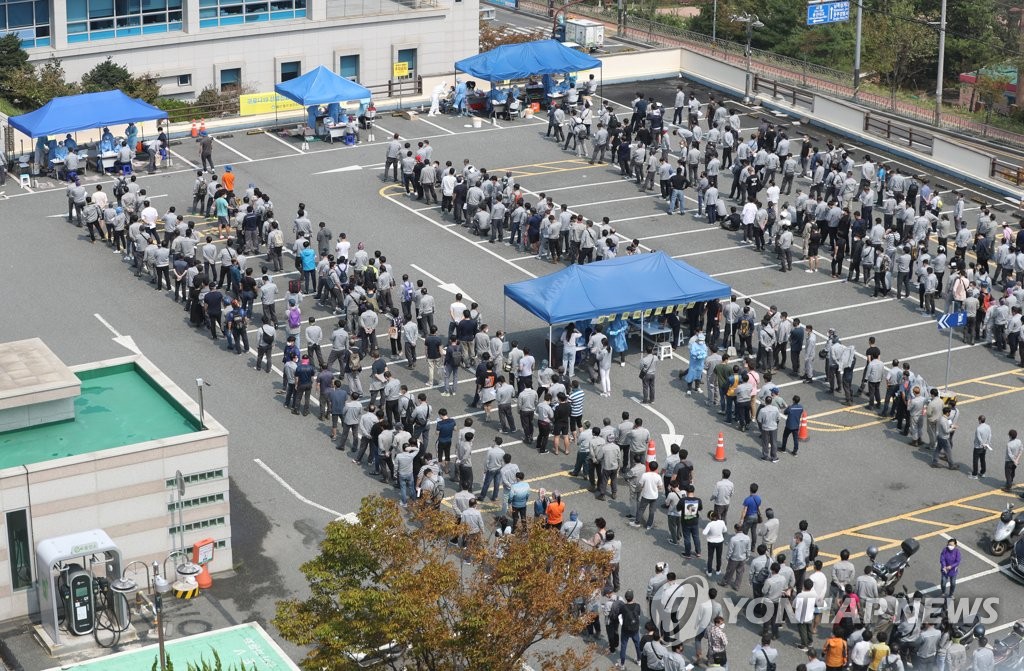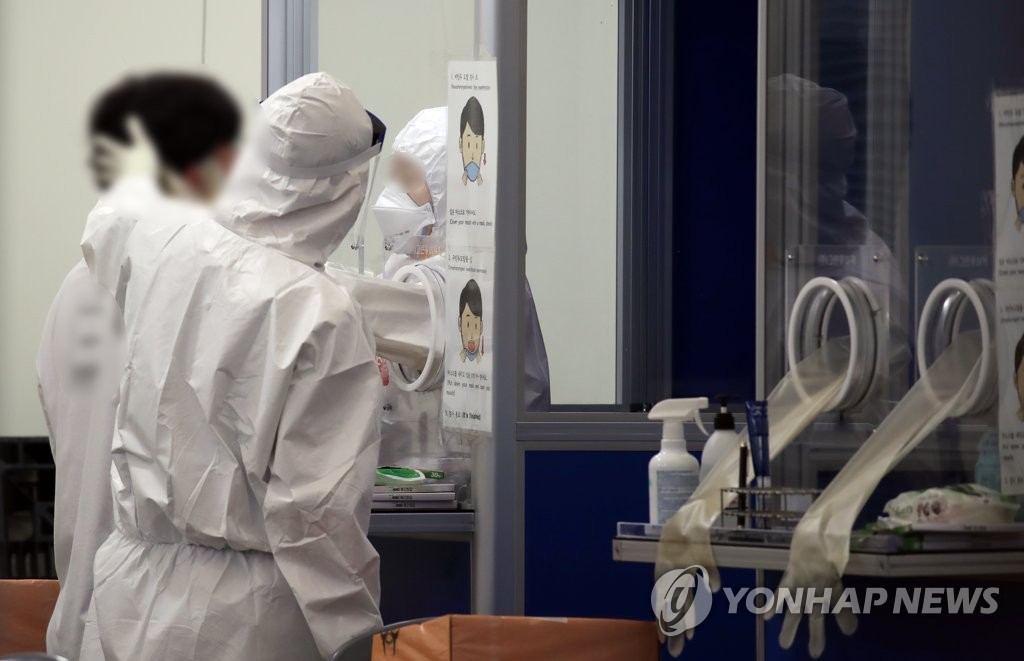New virus cases under 200 for week, virus fight still harried by cluster infections
South Korea’s new virus cases stayed below 200 for the seventh consecutive day Wednesday, but health authorities are still on guard against sporadic cluster infections across the nation.
The country added 156 more COVID-19 cases, including 144 local infections, raising the total caseload to 21,588, according to the Korea Centers for Disease Control and Prevention (KCDC).
It marked an increase from 136 new cases Thursday, which also slightly rose from 119 cases added the previous day, the fewest in 24 days.
Since Aug. 14, the country’s daily new virus cases have been in triple digits as infections tied to a church in northern Seoul and a rally in mid-August continued to pile up.
The number of daily new cases has been gradually falling after hitting 441 additional cases on Aug. 27, despite some ups and downs, apparently on the back of the country’s toughened social distancing measures.
“The number slowed as numerous businesses cooperated with the stricter social distancing scheme at the cost of damage to their livelihoods,” KCDC Director Jeong Eun-kyeong said during a daily briefing, implying there could be more “positive” outcomes if people continue to comply with the rules.




A medical worker works at a makeshift clinic in Gwangju, 320 kilometers south of Seoul, on Sept. 9, 2020. (Yonhap)
South Korea adopted what it calls the Level 2 social distancing scheme nationwide in mid-August, under which indoor meetings of more than 50 people and open-air gatherings of over 100 people are banned.
With the greater Seoul area, which houses half of the country’s 51-million population, accounting for most of the recently added virus cases, South Korea also launched an enhanced social distancing plan in the wider capital area on Aug. 30.
Under the measures, restaurants in the Seoul metropolitan area can operate normally from 5 a.m. until 9 p.m. but then can only offer takeout after that time. Franchise coffee chains, bakeries and ice cream parlors can only offer takeaway around the clock.
While the measure was originally planned to run through Sunday, health authorities decided to extend the scheme for another week through this coming Sunday, as untraceable cases and cluster infections from churches, apartments and offices continued to pop up.
“If we make more efforts in following the social distancing guidelines for the next five days, we may not have to further extend the measure,” Sohn Young-rae, a senior health official, said during a daily briefing, urging residents in the greater Seoul to stay home until the weekend.
Health authorities are currently in talks with the Seoul government to ban the regular worship services of Buddhist temples and Catholic churches as well. Currently, only Protestant churches are banned from having gatherings.
Of the newly identified local infections, 48 cases were reported in Seoul and 51 from Gyeonggi Province that surrounds the capital.
Other municipalities reported new infections, with the southeastern port city of Busan adding two cases and the southwestern city of Gwangju reporting 17 new infections.
The central city of Daejeon added eight cases, and the southeastern city of Ulsan reported four additional infections.
Cases traced to Sarang Jeil Church in northern Seoul, a hotbed of the recent spike in new infections, reached 1,167 as of Wednesday, remaining unchanged from the previous day.
The church-tied cases mark the largest cluster infection since more than 5,000 virus cases traced to the minor religious sect of Shincheonji were reported in Daegu in late February and early March.
Cases tied to the anti-government rally in Seoul on Aug. 15 rose by 12 to 551.
Health authorities said around 85 percent of the Seoul church members and people who participated in the rally have been tested.
Other sporadic cluster infections continued throughout the nation.
A Buddhist facility located in western Seoul reported two more patients, raising the related caseload to 14.
A logistics center of e-commerce giant Coupang located in eastern Seoul reported two additional cases, raising the toll to 12.
Another Catholic church in northern Seoul reported one additional case, reporting five patients so far.
The ratio of patients with untraceable infection routes over the past two weeks came to 22.2 percent, also straining the country’s virus fight. A whopping 41.5 percent were linked to cluster infections.
Over the period, patients aged 60 and above accounted for 36.2 percent of the newly added cases.
The number of patients in serious or critical conditions came to 154, up four from the previous day. The recent hike in the number of such patients has been emerging as yet another concern for health authorities as the greater Seoul area was running out of hospital beds quickly.
Although the country’s enhanced social distancing scheme apparently helped slow the spread of COVID-19 here, health authorities are worried that South Korea may suffer another major uptick in the coming weeks due to the Chuseok fall harvest holiday.
This year’s Chuseok holiday runs from Sept. 30 to Oct. 4. The Korean autumn harvest celebration is one of the country’s biggest traditional holidays and serves as a chance for family members to visit their hometowns.
Health authorities asked South Koreans to skip this year’s reunion.
To induce more people to stay home, South Korea is currently planning to charge drivers at toll gates of major highways. The country normally exempts such fees over Chuseok.
The country, meanwhile, reported 12 imported cases. The accumulated number of such cases reached 2,933.
Of the newly added imported infections, four were from Russia and three from the United States. There were also cases from Uzbekistan, Qatar, Ukraine and Algeria.
South Korea reported three more deaths, raising the death toll to 344. The fatality rate came to 1.59 percent.
The country reported 10 deaths over the past three days, as elderly patients aged 60 and above accounted for more than 85 percent of those in critical condition.
The total number of people released from quarantine after making full recoveries stood at 17,023, up 387 from the previous day.
South Korea has carried out 2,082,234 COVID-19 tests since Jan. 3. The country reported its first case on Jan. 20.
Of the patients being newly tested positive for the virus, around 30 to 40 percent of them have been asymptomatic.
South Korea, which said the previous day that it plans to mass-produce an antibody treatment for the novel coronavirus later this month, clarified on Wednesday that the production does not mean that it will be used immediately.
“We need to carry out more clinical tests to find more details about the effectiveness of the treatment,” Jeong said.
The KCDC also said there have been a number of patients who died after receiving remdesivir, an experimental drug conventionally used for Ebola, but that does not necessarily mean that its efficacy is questionable.